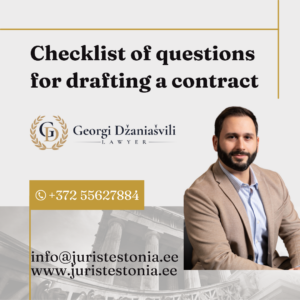
A contract is not just a formality. Even long-term partners or close friends must create a proper agreement between them. Anything can happen in business, and good relationships can turn into long-term disputes. A proper contract will help you protect your interests in advance.
Here is a short checklist of questions for drafting a contract:
-
Who concludes the contract?
It may seem simple, but even in the most basic things, there are risks involved. Therefore, it is important to verify that the person you are negotiating with is actually affiliated with the company and has the authority to sign.
-
What is the subject of the contract?
Each party should have a clear understanding of their obligations and deadlines. For instance, if one person composes a song and transfers the rights to use it, another person must pay a specified amount by a set deadline. The song must be transferred in a specific manner (such as on physical media or via cloud storage) within a particular timeframe.
-
Associated obligations and promises
Apart from providing a basic outline of the contract’s subject matter, it is essential to include ancillary obligations. For instance, in the case of a song, the agreement may specify requirements such as minimum duration (e.g., 3 minutes), quality, language, arrangement, and an assurance of the originality of the work.
The more specific the terms, the better the chances of avoiding any confusion or disputes.
-
Sanctions
In order to maintain discipline and motivation for fulfilling the terms of the contract, it is crucial to include provisions that stipulate fines or other forms of punishment (excluding physical harm) for violations of specific clauses or obligations, as well as the procedure for their payment.
It is important to consider what will happen if one party fails to make a payment, if the other party misses a deadline, or if the work is completed but not accepted by the other party.
-
Force Majeure
Before the coronavirus pandemic and the war in Ukraine, people used to rely on template force majeure clauses. However, given recent events, entrepreneurs should be more cautious with this provision.
Unfortunately, many have realized that the standard force majeure provisions fail to account for their specific risks. As a result, any issues not covered by the contract are subject to legal interpretation, which can be uncertain.
-
Other arrangements
For example, some important details to include in a contract are confidentiality clauses, the jurisdiction in which legal disputes will be resolved, and determining when a notice is deemed to have been received by the other party.
Lawyer Georgi Džaniašvili have extensive experience in drafting and reviewing contracts. I am ready to help in drawing up the necessary contract that will take into account your interests.
For advice or help please contact me here


